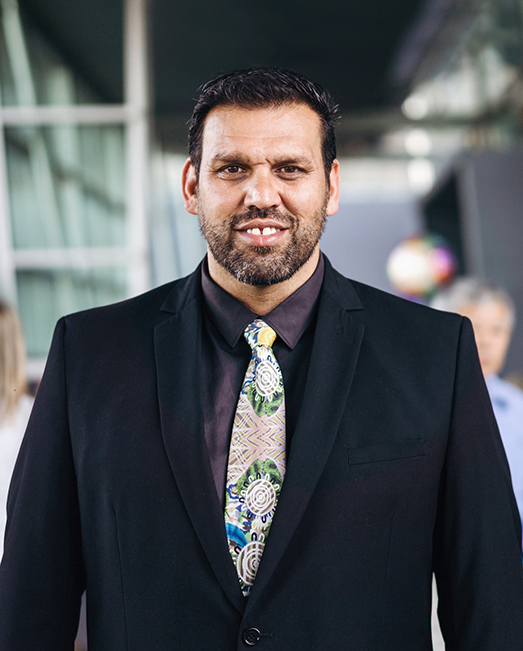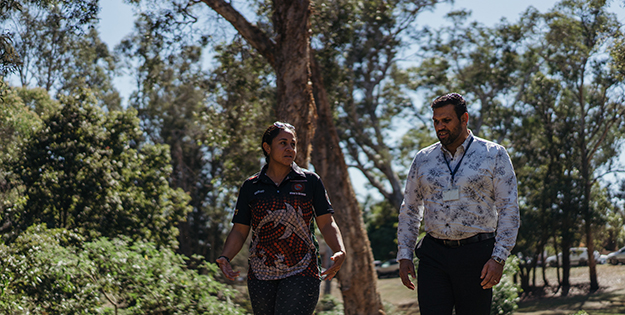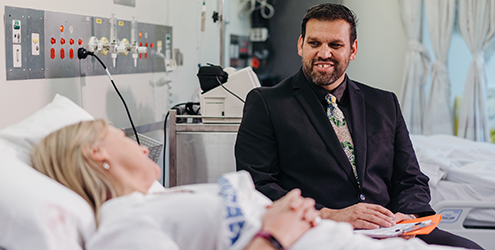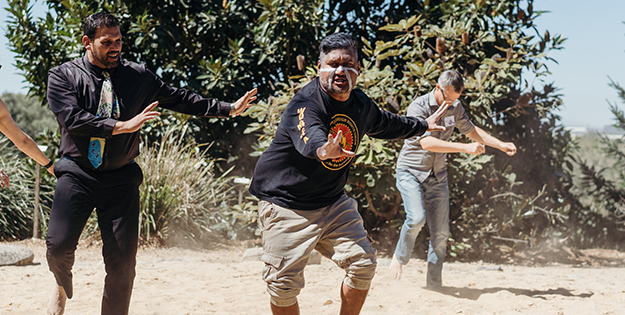Community
Copyright@ Australian Catholic University 1998-2026 | ABN 15 050 192 660 CRICOS registered provider: 00004G | PRV12008
Copyright@ Australian Catholic University 1998-2026 | ABN 15 050 192 660 CRICOS registered provider: 00004G | PRV12008

Meet the Aboriginal man who’s on a three-pronged mission: to help Indigenous and non-Indigenous Australians confront the scourge of mental illness, to right the wrongs of yesteryear, and to spin a few yarns along the way.
Derek Chong is pretty sure he was always destined to become a psychiatrist.
“It’s one of my mottos,” he says. “You don’t choose psychiatry, psychiatry chooses you.”
But he wasn’t always the biggest fan of the profession.
In the late 1980s, as an idealistic 19-year-old studying medicine in Newcastle, Dr Chong was an avowed opponent of the practices and principles of psychiatry.
“I was totally against it,” the 49-year-old Mullanjarli and Walkamin man says. “I didn’t like the way psychiatry tried to label people and put them into boxes.”
Struggling with his studies and his finances, he was forced to leave university and return to the workforce. But he went looking for a job that would provide a pathway back into medicine.
After a short stint as a residential care worker, he found himself studying and working as a psychiatric nurse.

“I guess it’s ironic, and it might look like I made a conscious decision to pursue psychiatry, but like I said, it chose me.”
The young Derek Chong was well aware that Aboriginal and Torres Strait Islander people had historically been subjected to misdiagnosis and mistreatment at the hands of psychiatric institutions.
And he was soon to learn those harmful past practices had cut close to the bone.
“My aunt did our genealogy and we found out that many, many years ago my great-great-grandmother died in a mental asylum, in the actual hospital that I started my training in,” Dr Chong says.
“As an Indigenous person, there's a journey you go on where you’re constantly processing generational trauma and trying to heal wounds from the past. I was already on that journey, but hearing the news about my great-great-grandmother made it clear that this is where I need to be, and this is what I'm going to do.
“It further endeared me to psychiatry and made me feel that, somehow, I would right the wrongs of yesteryear.”
Derek Chong’s gradual progression from care worker to nurse, doctor and psychiatry registrar endowed him with the practical smarts to complement his formal qualifications.
But in the early days, he questioned whether he would have what it takes to become a medical practitioner.
“Failing my first attempt at university shattered me in so many ways,” Dr Chong says.
“There was a lot of unconscious rhetoric around that Indigenous people are not smart, and I’d hear things like, ‘Hey, your people are better with their hands, so why do you want to become a doctor?’ And that made me ask myself: ‘Am I smart enough to do this?’”
Before long, he had the answer to that question.

Dr Chong connects with people.
After graduating with a Bachelor of Nursing from ACU in 1999, Dr Chong went on to study and practice medicine and become Queensland’s first Indigenous psychiatrist.
Having that title automatically made him a role model amongst others in his community, and he seems happy with that status. But his main focus is rolling up his sleeves and using his skills to make a difference.
“Having more Indigenous people as clinicians is positive because they create a safe environment for those in their community, and you need a safe environment in order to create healing,” Dr Chong says.
“One of the first things I ask someone I’m treating is: ‘Where’s your mob from?’ And by doing that, you’re treating the individual but you’re recognising straight away that they’re part of a bigger picture and a bigger story.”
His strength and perseverance is drawn largely from the wise words of his great-grandfather, a Mullanjarli man who had no access to a formal education, but who taught himself how to read and write from the Bible, and at 16, lied about his age and served in the First World War as a light horseman.
"When he came back, he didn't tell war stories,” Dr Chong says. “He talked about how education is key for our people.”
His great-grandfather’s legacy has become one of his main sources of inspiration – and, yet another motto.
“I’ve adopted his motto – ‘education is the key’ – because I truly believe in it,” adds Dr Chong.
“I’m always striving to spread the message that if more Indigenous people get an education, it will the lay the foundation for our community to thrive, and it will put us on an even playing field.”
Spreading that message requires a skill that Aboriginal and Torres Strait Islander people are well known for: storytelling.
Dr Chong regularly travels to rural and remote Indigenous communities to wax lyrical on topics like mental health, youth suicide, generational trauma and the importance of culture.
And he often tells stories about the elders who came before him. People like his great-grandfather, who on returning from the war, fought for the right of his children to attend school.
“That was in the 1930s and ‘40s, when it was up to the school principal to decide if Indigenous kids could attend school, and this principal out near Beaudesert kicked all the Indigenous kids out,” Dr Chong says.

“My great-grandfather went down to the school and said, ‘I fought for this country, and my children have a right to an education. If you have a problem with that, then I'll be taking it up with the RSL’.
“So there were a lot of people that were always active for Indigenous rights, yet we don't hear about those stories. That needs to come out too, along with the trauma stories, is the people who championed Indigenous causes.”
As well as his regular psychiatry clinics and his work with Queensland Health and the Inala Indigenous Health Service,
Dr Chong mentors doctors and psychologists to improve their consulting practice when treating Aboriginal and Torres Strait Islander peoples.
He is an ambassador for educational programs on a wide array of topics, and recently visited his Walkamin people in Far North Queensland to run a workshop on vicarious trauma and Indigenous pride.
“Cultural pride is one thing actually helping Indigenous people to move forward,” Dr Chong says.
“It’s about forging a closer connection to our culture and our expression of that culture, and mainstream Australians have taken pride in it too, which is great for all of us, because we all need that reconnection to who we are, to our culture and the land.”
As for the case of his great-great grandmother, Dr Chong has yet to delve into her patient file.
“I haven’t opened up that box yet, but you could say my career in psychiatry has been a journey to get her voice heard,” he says.
He hopes that sharing his family story will help other Aboriginal and Torres Strait Islander peoples to process their own generational trauma.
“Telling these trauma stories is all about giving people hope,” Dr Chong says. “It’s about getting people to recognise that even though these things happened, we can all heal the wounds of the past.”
Dr Chong won the Aboriginal and Torres Strait Islander Community Award and the Alumni of the Year Award in ACU’s Alumni Awards 2019. He graduated from ACU with a Bachelor of Nursing. Learn more about ACU.
Copyright@ Australian Catholic University 1998-2026 | ABN 15 050 192 660 CRICOS registered provider: 00004G | PRV12008